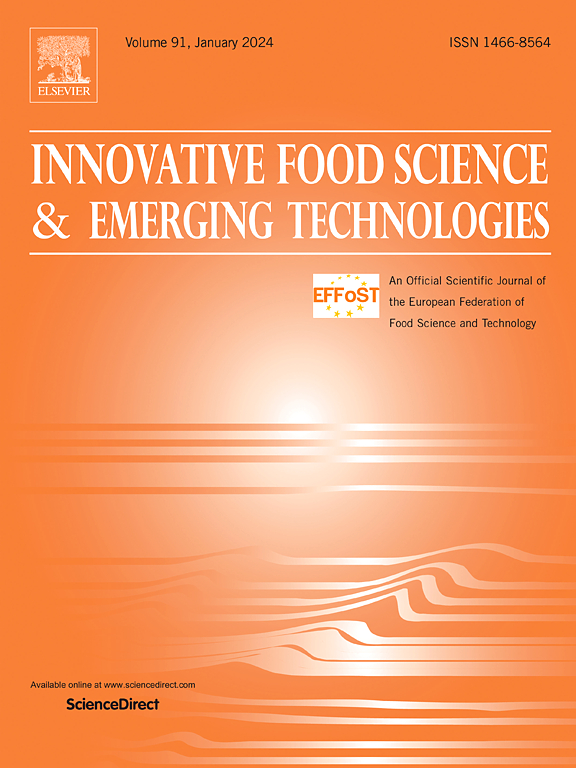电子束辐照对三种辣椒(Capsicum annuum L.)品种的微生物、植物化学物质和芳香特征的评估
IF 6.3
1区 农林科学
Q1 FOOD SCIENCE & TECHNOLOGY
Innovative Food Science & Emerging Technologies
Pub Date : 2024-11-16
DOI:10.1016/j.ifset.2024.103869
引用次数: 0
摘要
本研究全面评估了电子束辐照(EBI)在微生物净化方面的功效及其对三种辣椒(Capsicum annuum L.)理化特性的影响。在辐照剂量为 10 kGy 时,EBI 能明显减少细菌、酵母菌和霉菌的总数量,使其几乎检测不到(p < 0.05)。与未处理的对照组相比,EBI 处理过的样品的颜色特性没有发生明显变化(p > 0.05)。经 25 kGy 照射的 S17、H23 和 QJ 中类胡萝卜素的总含量分别减少了 16.91%、22.09% 和 24.76%。经 20 kGy EBI 处理的 S17 红辣椒样品的 DPPH 清除活性提高了 10.82%。值得注意的是,无论 EBI 剂量增加多少,H23 和 QJ 品种的辣椒素含量都没有明显差异(p > 0.05)。此外,对挥发性化合物的分析表明,随着辐射剂量的增加,新化合物(正甲基吡咯和二氢内脂二内酯)的形成也在增加。总体结果表明,高达 10 kGy 的 EBI 处理在保持辣椒粉基本理化特性的同时,还能有效灭活微生物。 工业相关性辣椒粉是人们饮食中不可或缺的调味品,也是辣椒产业的重要组成部分。然而,它在加工过程中容易受到微生物污染,从而引发食品安全问题。辐照处理可以灭活微生物,提高辣椒粉的质量。这项研究表明,EBI 可以有效实现微生物净化,减少收获后的损失,提高辣椒粉的卫生质量,为辣椒粉和其他调味品的安全提供技术参考。本文章由计算机程序翻译,如有差异,请以英文原文为准。
Evaluation of electron beam irradiation on the microbiological, phytochemicals, and aromatic profiles of three paprika (Capsicum annuum L.) varieties
This study provides a comprehensive evaluation of the efficacy of electron beam irradiation (EBI) for microbial decontamination and its effects on the physicochemical properties of three paprika (Capsicum annuum L.) varieties. EBI significantly reduced the total populations of bacteria, yeasts, and molds, rendering them almost undetectable at an irradiation dose of 10 kGy (p < 0.05). The color properties of EBI-treated samples showed no significant changes compared to untreated controls (p > 0.05). The total carotenoid content in S17, H23, and QJ irradiated with 25 kGy decreased by 16.91 %, 22.09 %, and 24.76 %, respectively. There was a 10.82 % increase in DPPH scavenging activity in S17 paprika samples treated with 20 kGy of EBI. Notably, no significant difference in capsaicin content was observed in H23 and QJ varieties, regardless the EBI dose increased (p > 0.05). Additionally, analysis of volatile compounds suggested that the formation of new compounds (n-methyl pyrrole and dihydroactinidiolide) was increased as the radiation doses increased. The overall results suggested that EBI treatment up to 10 kGy demonstrated a high level of effectiveness in microbial inactivation while preserving the essential physicochemical properties of paprika.
Industrial relevance
Paprika is an indispensable condiment in people's diets and a crucial component of the chili industry. However, it is susceptible to microbial contamination during processing, leading to food safety concerns. Irradiation treatment can inactivate microorganisms and enhance the quality of paprika. This study demonstrates that EBI can effectively achieve microbial decontamination, reduce post-harvest losses, improve the hygienic quality of paprika, and provide a technical reference for the safety of paprika and other spices.
求助全文
通过发布文献求助,成功后即可免费获取论文全文。
去求助
来源期刊
CiteScore
12.00
自引率
6.10%
发文量
259
审稿时长
25 days
期刊介绍:
Innovative Food Science and Emerging Technologies (IFSET) aims to provide the highest quality original contributions and few, mainly upon invitation, reviews on and highly innovative developments in food science and emerging food process technologies. The significance of the results either for the science community or for industrial R&D groups must be specified. Papers submitted must be of highest scientific quality and only those advancing current scientific knowledge and understanding or with technical relevance will be considered.

 求助内容:
求助内容: 应助结果提醒方式:
应助结果提醒方式:


